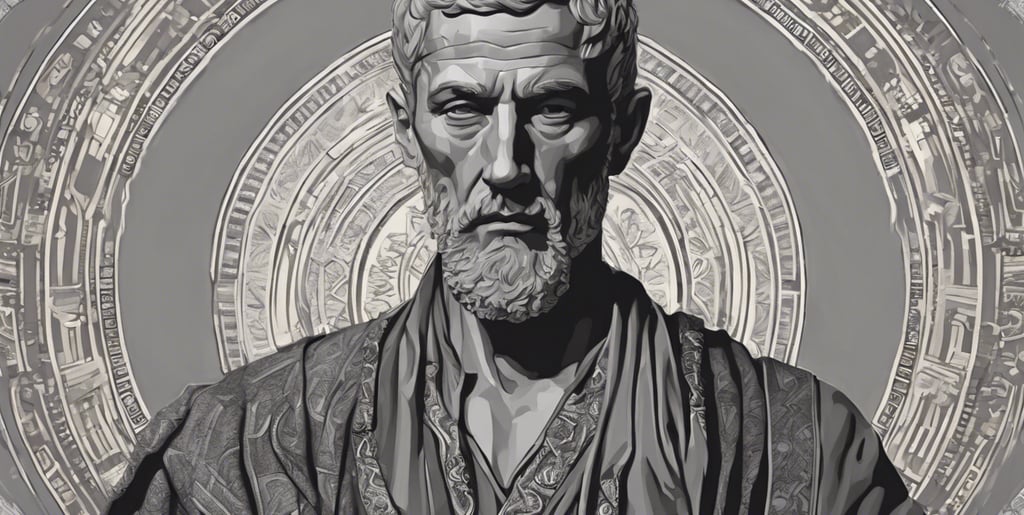Is Stoicism Still Relevant? Ancient Wisdom for Modern Challenges
In recent years, Stoicism has experienced a remarkable revival. From Silicon Valley entrepreneurs to mental health professionals, people are turning to this ancient philosophy for guidance. But the question remains: Is Stoicism still relevant in our fast-paced, technology-driven world?
STOICISM
8/11/20243 min read


What is Stoicism?
Before diving into its relevance, let's briefly define Stoicism:
Founded in Athens by Zeno of Citium around 300 BCE
Emphasizes virtue, reason, and living in harmony with nature
Key figures include Seneca, Epictetus, and Marcus Aurelius
Core Stoic Principles
Focus on what you can control
Practice emotional regulation
Cultivate virtue and wisdom
Accept nature's course (Amor Fati)
Stoicism in the Modern World
Mental Health and Well-being
Cognitive Behavioral Therapy (CBT) draws heavily from Stoic principles
Mindfulness practices align with Stoic self-reflection techniques
Business and Leadership
Stoic concepts of resilience and focus appeal to entrepreneurs
Decision-making frameworks based on Stoic ethics
Personal Development
Stoicism offers practical tools for self-improvement
Emphasis on personal responsibility resonates with modern audiences
Real-Life Applications of Stoicism: Modern Examples
Stoicism isn't just a theoretical philosophy; it has practical applications in various real-life situations. Here are some examples of how people have used Stoic principles to navigate challenges:
1. Military and Veterans
The U.S. Armed Forces have incorporated Stoic principles into resilience training programs for soldiers.
2. Sports and Athletics
The New Zealand All Blacks rugby team incorporates Stoic-inspired mental toughness training in their preparation.
3. Business Leadership
Massimo Pigliucci, a professor of philosophy, applies Stoic principles in his decision-making process as a department chair at City College of New York.
Jack Dorsey, co-founder of Twitter and Square, has spoken about using Stoic practices to manage stress and maintain perspective in the fast-paced tech world.
4. Personal Challenges
Tim Ferriss, author and entrepreneur, has openly discussed using Stoic exercises like negative visualization to overcome fear and anxiety in his personal and professional life.
Ryan Holiday, author of several books on Stoicism, applied Stoic principles to navigate a public relations crisis early in his career.
5. Healthcare and Pandemic Response
Healthcare workers during the COVID-19 pandemic have reported using Stoic practices to cope with stress and emotional burnout.
Dr. Konstantin Vrandopulo, an oncologist, uses Stoic principles to help both himself and his patients deal with the emotional challenges of cancer treatment.
6. Education
Several schools, including Fitch High School in Connecticut, have introduced Stoic philosophy into their curriculum to help students develop emotional resilience and critical thinking skills.
7. Addiction Recovery
Rehabilitation programs like Stoic Recovery have incorporated Stoic principles to help individuals overcome addiction and maintain sobriety.
Why Stoicism Remains Relevant
1. Coping with Uncertainty
In our rapidly changing world, Stoic principles provide a stable framework for navigating uncertainty.
2. Digital Age Challenges
Stoicism offers guidance on maintaining focus and tranquility amidst constant digital distractions.
3. Stress Management
Stoic practices like negative visualization help in managing stress and anxiety.
4. Ethical Decision-making
In an era of complex moral choices, Stoic virtue ethics provide a compass.
5. Resilience Building
Stoic teachings on adversity help develop mental toughness and adaptability.
Modern Applications of Stoic Principles
Mindfulness apps incorporating Stoic meditations
Corporate training programs based on Stoic leadership principles
Self-help books applying Stoic wisdom to contemporary issues
Online communities dedicated to practicing Stoicism
Criticisms and Limitations
Potential for Misinterpretation
Risk of using Stoicism to justify emotional suppression
Misunderstanding the concept of accepting fate as passivity
Cultural Differences
Some argue that Stoicism's Greco-Roman origins limit its universal applicability
Compatibility with Modern Science
Debate over how well Stoic psychology aligns with current scientific understanding
Adapting Stoicism for Today
Integrating with Modern Psychology
Combining Stoic practices with evidence-based psychological techniques
Addressing Contemporary Issues
Applying Stoic principles to modern challenges like climate change and social justice
Technology and Stoicism
Exploring how Stoic wisdom can guide ethical technology use and development
Conclusion: Timeless Wisdom for a Changing World
While the world has changed dramatically since the days of Marcus Aurelius, the core tenets of Stoicism remain surprisingly relevant. Its emphasis on personal ethics, emotional resilience, and rational thinking provides a valuable toolkit for navigating the complexities of modern life.
Stoicism's enduring appeal lies in its practicality and focus on what individuals can control. In a world of constant change and uncertainty, the Stoic approach offers a path to inner peace and purposeful living.
As we face the unique challenges of the 21st century, Stoicism continues to offer timeless wisdom, adapted for our times but rooted in age-old insights into human nature and the pursuit of a meaningful life. The real-life examples demonstrate how Stoicism's practical wisdom can be applied across various fields and personal challenges, further cementing its relevance in today's world.
Waste no more time arguing about what a good man should be. Be one - Marcus Aurelius
We suffer more often in imagination than in reality - Seneca
Wealth consists not in having great possessions, but in having few wants - Epictetus
